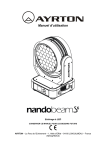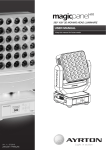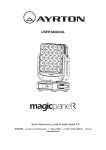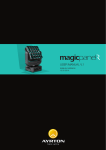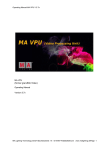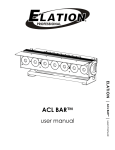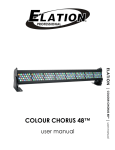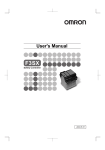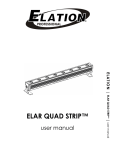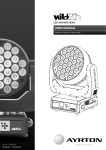Download USER MANUAL V.1
Transcript
USER MANUAL V.1 ENGLISH VERSION 01 05 2015 Summary 4 4 4 5 6 6 6 7 7 8 9 10 13 14 15 16 16 17 18 Introduction Safety instructions Conditions of use Presentation and features Dimensions Description Installation instructions Installation method using truss hooks DMX512 connection Instructions for using the wireless internal DMX system Control Panel MagicBlade R control panel menu - Option details Master/Slave Mode settings Led mapping DMX Chart Error Messages Care and maintenance Technical Specifications Warranty USER MANUAL _ 3 Introduction crushed in any way. Handle these cables with extreme caution while they are connected to a power source. Thank you for selecting the AYRTON MAGICBLADE-R luminaire. Your MAGICBLADE-R conforms to Class 1 safety standards. The unit must be grounded electrically. Make sure that the power source connected to your MAGICBLADE-R is switched off before attempting any work on it. WARNING ! This product is not suitable for household use. You now own a professional lighting unit that offers endless possibilities. Before installing, make sure that no damage was done to your luminaire during transport. If this is the case, do not use the product and immediately contact your authorized AYRTON dealer. For your own safety and that of others, please read this instruction manual carefully before installing the unit. Anyone involved in installing, operating or servicing the MAGICBLADE-R must: •• Be a qualified, authorized professional •• Strictly follow the instructions in this user manual. Please take the time to read this manual carefully and thoroughly before installing and operating the luminaire. You should have a good knowledge of its operating conditions and all pertinent product information. After you have become familiar with this manual, we recommend that you keep a copy for future use. All the information found in this manual is subject to change without notice. AYRTON reserves the right to modify and upgrade its range of products, with no obligation to integrate these changes into products already sold. Installation and connection to an electrical source must be performed by an authorized installer. AYRTON declines all responsibility should this luminaire be installed by an unqualified person. Never disconnect your MAGICBLADE-R by pulling on the power cable! First unlock the connector lock ring on the power cable until it is fully disengaged, and then gently pull on the connector to disconnect the cable. Do not connect or disconnect the power cable of your MAGICBLADE-R with wet hands. At first use, your MAGICBLADE-R may give off an odor. This is a normal occurrence that should dissipate after a few minutes of operation. WARNING! Do not connect or disconnect the power cable at your MAGICBLADE-R if the cable is energized! This could cause arcing and damage your MAGICBLADE-R, requiring repair. Be careful to power off your MAGICBLADE-R by removing the power plug from the source, before connecting or disconnecting the luminaire. WARNING! This unit contains Class 2 LED emitters (EN60625-1): 1994) SAFETY INSTRUCTIONS Please read the safety instructions and warnings in this manual carefully before installing and operating the MAGICBLADE-R. WARNING! Risk of electric shock. Use caution when handling. This luminaire requires high voltage, which can result in electric shock. The MAGICBLADE-R left our factory in perfect working condition. However, if you notice a defect, immediately contact your authorized AYRTON dealer before use. The manufacturer cannot be held responsible for damages caused by a failure to follow the safety, installation or assembly instructions contained herein, or by any modification made to the luminaire. This luminaire uses multiple high-power (Class 2) LED-type (Light Emitting Diode) lamps. Never look directly into the lamps if lit or stand directly in line with the luminaire if close by. Installation, removal or replacement of the unit must be performed with power off to prevent any risk of glare and eye injury. WARNING! The fixture quickly becomes very hot during operation. To avoid risk of burn, never handle or adjust the luminaire while it is energized and after it has been lit for more than 10 consecutive minutes. Some parts of the luminaire can reach a high temperature, particularly the body/radiator. Turn off the luminaire and wait for it to cool before handling. Failure to observe the safety, installation or assembly instructions contained herein, or any modification made to the MAGICBLADE-R luminaire will render the warranty null and void. Conditions of use Check that the supply voltage does not exceed the maximum authorized limit. Check that your electrical installation complies with current standards. Your MAGICBLADE-R is a moving-head luminaire equipped with multiple LEDs intended for professional use (e.g., architectural, stage, television, theater, or museum lighting). In all cases, make sure that the power cables attached to your MAGICBLADE-R have not been damaged due to cuts and splices or The MAGICBLADE-R luminaire has an IP20 protection rating. It is intended strictly for indoor use. It must never be partially or fully submerged, even USER MANUAL _ 4 temporarily. Check that your luminaires have been installed for an application that is compatible with this information. Condensation may form on your MAGICBLADE-R in the following cases: •• Immediately after turning on the heating •• In places with fog or a high level of humidity •• When the luminaire is suddenly moved from a cold to a warm environment, or vice versa. In such cases, you must wait until the luminaire readjusts to the ambient temperature of the room where it will be installed for operation. Do not shake the MAGICBLADE-R while installing or handling. Do not by pull the MAGICBLADE-R by one of its cables to move it. Lift the luminaire by its handles. Choosing the appropriate place to install the MAGICBLADE-R is essential. The following points should be observed: •• Do not expose it to a heat source. •• Do not install it near flammable materials. •• Be sure that dust or miscellaneous debris cannot clump around the body of the luminaire as this may interfere with its optimal cooling and proper operation. •• The MAGICBLADE-R must be installed out of reach of the public and all persons not authorized to operate the luminaire. We recommend a minimum distance of 20 cm between the outside surface of the light and the illuminated object. The color mixture of the MAGICBLADE-R can be improved if the illuminated surface is very close to the luminaire (up to about 50 cm). Due to the nature of its cooling principle, you should never prevent air from circulating around the body of the luminaire. You must provide a minimum clearance of 20 cm around your MAGICBLADE-R to allow for cooling. The MAGICBLADE-R can be installed in a ground pit or any other confined enclosure only under certain conditions. With this kind of installation, a system of forced ventilation should be used up to allow air to circulate freely around the luminaire(s). The air must be constantly renewed because the luminaire cannot be operated in closed system. Failure to comply with these requirements may destroy or prematurely wear the MAGICBLADE-R, and AYRTON cannot be held responsible. Please consult your AYRTON dealer for more information on this type of installation. No load should be placed on the MAGICBLADE-R. The fixture must not be installed in such a way as to allow a person, vehicle or any object to run over or park on it. Never lay or drop any hard, heavy, or blunt, objects on the MAGICBLADE-R. This includes items made of glass or porcelain (e.g., bottles, dishware, or glass beads). The luminaire is made of materials such as plastic and extruded aluminum, making it resistant but not unbreakable. Objects made of hard materials such as steel or glass that fall on the unit may cause breakage of the plastic parts or the body. AYRTON cannot be held responsible for the luminaire’s broken plastic parts or body, which are not covered under warranty. The temperature of the room where the MAGICBLADE-R is installed must never exceed 45°C (Ta = 45°C). The MAGICBLADE-R luminaire requires a 110-240 VAC supply voltage. Check that the bracket on which you hang or attach your MAGICBLADE-R can sustain the weight of the luminaire (12 kg), taking into consideration all necessary safety factors. Do not use your MAGICBLADE-R before being familiar with these recommendations and do not allow unqualified personnel to handle the product. To transport your MAGICBLADE-R, we strongly recommend that you use the complete original packaging, including the dense protective foam inserts. If your 602 MAGICPANEL is not being used for a long period, you should disconnect the luminaire from the power source. Never dispose of the MAGICBLADE-R in a rubbish bin. Ensure that it is recycled. Please consult the current legislation in your country on recycling electronic equipment. WARNING! The number of daisy chain, or tandem, connections to the MAGICBLADE-R (power input and output sockets on the luminaires) is limited for safety reasons. The maximum authorized number of connections is as follows, with the power line protected by a 10A circuit breaker: 16 MAGICBLADE-R units on the same source at 230 VAC or 6 MAGICBLADE-R units on the same source at 110 VAC. PRESENTATION AND FEATURES MAGICBLADE-R is a non-waterproof moving head wash light (IP20 protection rating) using the latest generation of high-performance of LEDtype lamps. This luminaire can be controlled remotely by an external DMX512 signal. The MAGICBLADE-R incorporates multi-chip LEDs using 4 colors: Red, green, blue and white. This color-light luminaire operates on the CMY additive color principle and along with white light can potentially render a palette of 4.2 billion colors. The MAGICBLADE-R has a total of 7 LEDs that can be controlled independently. The luminaire requires from 18 to 44 DMX channels to be controlled via an external command system that sends a DMX512 signal (see below for details). To adjust the settings on the MAGICBLADE-R (i.e., DMX address, DMX operating mode and other options), a Remote Device Management (RDM)-type DMX controller may be required. The DMX RDM protocol is a universal, widely used standard. There are a multitude of RDM DMX controllers on the market from different manufacturers (excluding AYRTON). It is worth noting that an RDM DMX controller is not required to change the settings on the MAGICBLADE-R. A light console or any standard DMX-type controller is sufficient. USER MANUAL _ 5 The MAGICBLADE-R consists of a metal frame and plastic covers. The power connectors and DMX512 signal connectors are on the back of the fixture’s base. Description Dimensions Bottom view Front view Side view 1. Collimator 2. LCD Display 3. Left button 4. MODE/ESC button 5. Down button 6. Enter button 7. Right button 8. Up button 9. Antenna – Wireless DMX 10. DMX512 output connector (5-pin) 11. DMX512 input connector (5-pin) 12. RJ45 output connector 13. RJ45 input connector 14. Power source input connector 15. Power source output connector 16. Fuse holder INSTALLATION INSTRUCTIONS During installation please observe the instructions according to GB7000.15 / EN60598-2-17 standards and other national standards applicable. This luminaire should be installed by a qualified technician. The fixture should be used in an environment with a temperature between -5°C and +45°C. Do not operate the luminaire outside this temperature range. The luminaire must be hung so that the weight of this unit multiplied by 10 can be sustained for 1 hour without causing the suspension system or the supporting structure to be deformed. USER MANUAL _ 6 The installation must always be secured at a second attach point, e.g., by a safety cable of the appropriate size. Do not stand under the luminaire while it is being installed, dismantled or serviced. The operator must ensure that a qualified technician has approved the installation of the luminaire for safety before it is first operated. •• Attach the clamp to the omega bracket using an M12 screw. •• Insert the quick-lock fasteners of the first omega bracket into the respective holes on the base of the unit. Turn the quick fasteners fully clockwise. •• Install the second omega bracket. •• Insert the safety cable through the holes at the bottom of the base and the truss or a stable attachment point. Insert the end into the hole and tighten the safety screw. Installation should be inspected once a year by a qualified technician. Note: The last step is very important to ensure that the luminaire does not fall. WARNING! The installation of this luminaire must be validated by a qualified technician before it is used for the first time. The luminaire should be installed in a location where the public cannot, touch, walk or sit on the luminaire. Suspending the luminaire and/or installing it high up requires considerable experience, e.g., calculating load, selecting and adapting quality fastening materials, and periodically inspecting the entire installation. Without this skill and knowledge, do not attempt to install this unit by yourself. Improper installation may cause an accident resulting in personal injury or death. WARNING! The luminaire should be connected to an electrical source by a qualified electrician. Before installing the luminaire make sure that the selected installation spot can support at least 10 times the weight of the unit. Connect the luminaire to the power source by the power cord. DMX512 connection Connect the DMX input (XLR connector) cable of the luminaire to the DMX output (female XLR connector) of your controller. You can connect multiple luminaires to this same DMX line in a daisy chain. The DMX cable must be a shielded twisted pair that is equipped with male and female XLR connectors. Refer to the following diagram when connecting the MAGICBLADE-R luminaires in a daisy chain: Address 41 Address 21 Address 1 Warning ! INSTALLATION METHOD USING TRUSS HOOKS Refer to the following diagram when installing the MAGICBLADE-R with truss hooks using omega brackets: To ensure maximum stability at a 100-120 VAC, no more than six luminaires should be connected together. A seventh luminaire should be connected to another power source. When the power voltage is 220-240 VAC, a maximum of sixteen luminaires can be connected together in this way. A sixteenth luminaire should be connected to another power source. USER MANUAL _ 7 DMX512 CONNECTION WITH TERMINATION PLUG For installations where the DMX cable must extend over long distances, or if it is located near areas with major electrical disturbance, it is recommended to use a DMX termination plug. This helps prevent luminaires from malfunctioning due to interference. The DMX termination plug, composed simply of a male XLR input connector with a 120-Ohm resistor, is soldered between pins 2 and 3. This plug must be connected to the DMX output of the last luminaire in the chain. Refer to the following diagram: INSTRUCTIONS FOR USING INTERNAL DMX SYSTEM THE WIRELESS 1. REQUIRED HARDWARE DMX512 controller, LumenRadio™ wireless MAGICBLADE-R luminaires with wireless receivers. transmitter, and 2. WIRELESS INDICATOR – FIXTURE SCREEN •• Solid green: Connected to transmitter and receiving DMX data •• Solid red: No connection to transmitter 3. W-DMX IN THE FIXTURE MENU: This part of the menu allows you to select if the unit will be controlled by wireless DMX (see WDMX in OPTION DETAILS). Choose the WDMX option in the “Signal Select” submenu under the “OPTION” menu. The fixture will always return the DMX signal through the XLR 5 output. REST WDMX: Antenna (in the “Wireless DMX” submenu) This function allows you to remove a luminaire from a wireless network, e.g., to pair it with another transmitter. Using DMX via Art-Net To control the MAGICBLADE-R DMX via ART-NET, the fixtures must be interconnected with CAT5 RJ45 cable. Be careful to enter all necessary information into the ART-NET universe being used and specify in the menu that the MAGICBLADE-R is being controlled through ART-NET (see OPTION DETAILS in the “OPTION” menu). WARNING! The MAGICBLADE-R can only read the first twenty universes of an ART-NET packet. If you have more than 20 universes in your network, you must use a configurable switch to filter each RJ45 output. 4. CONFIGURING THE WIRELESS SYSTEM: •• Connect the transmitter to the DMX controller. •• The fixture’s indicator should default to red. •• Press the configuration button on the transmitter for 3 seconds. Wait 5-10 seconds for the pairing to occur. The “wireless” indicator on the receiver fixture should be green. •• Once pairing is achieved, the receiver fixture retains the connection in memory. When the installation is powered on, pairing will be done automatically. 5. REMOVE RECEIVER FROM TRANSMITTER T1 AND PAIR WITH ANOTHER TRANSMITTER T2. The luminaire’s DMX address setting All luminaires have a DMX start address correctly set when using a DMX signal to control them. The DMX start address is the channel from which the luminaire “listens” to the digital control information sent by the DMX controller. The start address must conform to the one recorded on the DMX controller to run the luminaire. This address is the DMX value that appears on the luminaire’s display. You can set the same address for all the luminaires, or some of them, but you can also set a different address for each luminaire, as needed. If you do set the same address for all the luminaires, they will all “listen” from the DMX channel you have set. The instructions sent by the DMX controller will affect all luminaires at the same time. If you set a different address per luminaire, the DMX controller can control each independently. If, for instance, the fixtures are preset in 20-channel DMX mode (required for full control), you will need to adjust the DMX address for the luminaires as follows: The first unit with DMX address 001, the second with DMX address 021 (20 + 1), the third with DMX address 041 (20 + 21), etc. Case 1: Removing a receiver •• Activate the REST WDMX function in the fixture menu (see OPTION DETAILS). •• The “wireless” indicator on the fixture screen should be red. The receiver fixture is now disconnected from transmitter T1. •• Press the configuration button on transmitter T2 for at least 3 seconds, and the unit will start to pair with the receiver fixture. Case 2: Removing all receivers from transmitter T1 to pair all to transmitter T2 •• Press the configuration button on transmitter T1 for at least 5 seconds to reset pairing with receiver fixtures. •• All green indicators on the receiving fixtures will turn red, indicating that the receiver fixtures are no longer paired with transmitter T1. •• Press the configuration button on transmitter T2 for at least 3 seconds to pair it with the receiver fixtures. Note: •• Unpair receiver fixtures from transmitter after use. USER MANUAL _ 8 Address Set Dmx Addr A001~AXXX DMX address setting User Mode Stand Mode Basic Mode Extend Mode User Mode A User Mode B User Mode C User’s mode to change channel numbers Edit User Max channel PAN : Preset User modes Status Addr via DMX No DMX Mode Pan Reverse Tilt Reverse Pan Degree Feedback Pan/Tilt Spd Mic Sens. Hibernation ON/OFF Close/Hold/Auto/Music ON/OFF ON/OFF 630/540 ON/OFF Speed 1~ 4 0~99% OFF, 01M~99M,15M Add. via DMX Auto run if no DMX Pan Reverse movement Tilt Reverse movement Pan Degree Select Movement Feedback Reset Pan/Tilt Sensitivity of Mic. Stand by Mode Service PIN Service PIN RDM PID Set IP Set LED BIN Password=XXX xxxxxx xxx.xxx.xxx.xxx LED BINA LED BINB xx Service Password“=050” RDM PID Code KlingNet Device ID LED BIN LED BIN IP Addr Users Mode •• Do not connect the DMX console to the fixture when it is controlled via wireless. This could cause interference between the two modes of operation. CONTROL PANEL (MENU OPTIONS) A large number of settings are accessible from the fixture’s control panel. A good working knowledge of it will enhance the fixture’s possibilities. key until the display Cycling through the menus is performed by pressing the , or keys, as required: Press the key to select the desired menu. Change the selection by pressing the , or , Confirm your selection by pressing the Exit a menu at any time by pressing the Set Device ID , keys. Fans Control Head Control Auto High Low Head Fans Speed Mode Select Disp.Setting Shutoff Time Flip Display Key Lock DispFlash 02~<60m> <05m> ON/OFF ON/OFF ON/OFF Display shutoff time Reverse 180 degree Key Lock No Signal Flash Signal Select DMX WDMX Art--Net DMX Wireless DMX Art-Net LED Control Kling-Net OFF Kling-Net RGB Kling-Net RGBW KlingNet confer Kling-Net confer RGB Kling-Net confer RGBW Set Universe xx Art-Net Universe NO. Temp. C/F Celsius Fahrenheit Temperature switch between °C/°F Initial Pos. PAN =XXX Initial effect position Wireless DMX Act&Data Out Rest WDMX Act & Data Out Reset Wireless DMX Mem Trigger DMX Value Disp. Set To Slave Auto Program Music Ctrl. Reset Default ON/OFF Restore factory sett. Time Info. Current Time Ttl Life Hrs Last Run Hrs Timer PIN Clr Last Run XXXX(Hours) XXXX(Hours) XXXX(Hours) Password=XXX ON/OFF Temp. Info Head Temp. XXX °C/°F Software Ver V1.0... Software version Network IP,Mask,Mac Network setting Home All Pan&Tilt Reset all motors Reset Pan&Tilt Test Channel PAN …… Test function Manual Ctrl. PAN =XXX : Fine adjustment of parameters Calibration --Password-PAN : Password “050” Calbrate and adjust the effects to standard/right position Select Prog. Prog. Part 1 = Program 1 ~ 10 Program 1 Prog. Part 2 = Program 1 ~ 10 Program 2 Prog. Part 3 = Program 1 ~ 10 Program 3 Select programs to be run Edit Prog. Program 1 : Program 10 Program Test Step 01=SCxxx Step 64=SCxxx Testing program Program in loop Save and exit Edit Scenes Edit Scene 001 ~ Edit Scene 250 Pan,Tilt,…… --Fade Time---Secne Time-Input By Outside Save and automatically return manual scenes edit Scenes Input XX~XX Options You can access the Main Menu by pressing the flashes. key. key. Notes: You can return to the display by pressing the or keys from the basic display. If the screen fails to respond, hold the “Mode Esc” key down for at least 3 seconds to free up the display. Preset Test Info The fixture’s menu functions are described in the following table: USER MANUAL _ 9 PAN…… Slave1,Slave2,Slave3 Master / Alone Master / Alone DMX value display Slave setting Auto program Music control Automat. scenes rec MAGICBLADE-R CONTROL PANEL MENU – OPTION DETAILS The following section provides details on the options that can be selected through the control panel menu. Refer to the table above. Note: You can exit this menu at any time by pressing “Mode Esc” repeatedly until you return to the home screen. ADDRESS Allows you to change a DMX address from the fixture’s control panel. ww Access the menu by pressing the “Mode Esc” key. ww Go to the “ADDRESS” menu and press “Enter”, then find “Set DMX Address.” ww Use the up/down arrows to scroll through until you locate the desired address and press “Enter” to confirm. MODE USERS MODE Allows you to select the DMX mode from the following: “Basic Mode” (18 DMX channels ), “Standard Mode” (20 DMX channels), “Extended Mode” (160 DMX channels), “User Mode A”, “User Mode B”, “User Mode C.” ww Access the menu by pressing the “Mode Esc” key. ww Use the up/down arrow keys to reach the “MODE” menu and press “Enter.” Then from “User Mode” choose one of the 6 modes above. Consult the “CHART DMX” table for more information on Basic, Standard and Extended Mode. “User Modes A”, “B”, or “C” are user-definable. EDIT USER A, B, C To customize the mode, go to “MODE” and select “Edit UserMode A, B or C” and press “Enter.” Scroll through each setting and press “Enter” to set the desired address. OPTIONS STATUS No DMX Mode Defines the fixture’s state when there is no command signal from the DMX controller. The fixture can either launch a program automatically, close the shutter, or even remain in the state when the last DMX values (Hold) were received. The default setting is “Hold.” ww Access the menu by pressing the “Mode Esc” key. ww Use the up/down arrow keys to reach the “OPTION” menu and press “Enter.” Then use the left/right arrow keys to select “Status.” Finally, use the left/right arrow keys to select “No DMX Mode.” ww Scroll through the different options using the left/right arrows and press “Enter” to confirm. Pan Reverse Reverses the PAN movement. ww Access the menu by pressing the “Mode Esc” key. ww Use the up/down arrow keys to reach the “OPTION” menu and press “Enter.” Then use the left/right arrow keys to select “Status.” Finally, use the left/right arrow keys to select “Pan Reverse.” ww Scroll through the different options using the left/right arrows and press “Enter” to confirm. Tilt Reverse Reverses the direction of the TILT movement. ww Access the menu by pressing the “Mode Esc” key. ww Use the up/down arrow keys to reach the “OPTION” menu and press “Enter.” Then use the left/right arrow keys to select “Status.” Finally, use the left/right arrow keys to select “Tilt Reverse.” ww Scroll through the different options using the left/right arrows and press “Enter” to confirm. Pan Degree Adjusts the amplitude of the PAN movement at 630° or 540°. ww Access the menu by pressing the “Mode Esc” key. ww Use the up/down arrow keys to reach the “OPTION” menu and press “Enter.” Then use the left/right arrow keys to select “Status.” Finally, use the left/right arrow keys to select “Pan Degree.” ww Scroll through the different options using the left/right arrows and press “Enter” to confirm. Tilt Degree Adjusts the amplitude of the TILT movement at 540° or 270°. The 540° function allows you, for instance, to add an accessory to the rear part of the fixture head. ww Access the menu by pressing the “Mode Esc” key. ww Use the up/down arrow keys to reach the “OPTION” menu and press “Enter.” Then use the left/right arrow keys to select “Status.” Finally, use the left/right arrow keys to select “Tilt Degree.” ww Scroll through the different options using the left/right arrows and press “Enter” to confirm. Feedback Readjusts the PAN and TILT positions automatically in the event of accidental shifting due to a physical shock. ww Access the menu by pressing the “Mode Esc” key. ww Use the up/down arrow keys to reach the “OPTION” menu and press “Enter.” Then use the left/right arrow keys to select “Status.” Finally, use the left/right arrow keys to select “Feedback.” ww Scroll through the different options using the left/right arrows and press “Enter” to confirm. Pan/Tilt Spd You can choose between four movement speeds, from “Speed 1” to “Speed 4.” The “Speed 1” setting is the fastest. ww Access the menu by pressing the “Mode Esc” key. ww Use the up/down arrow keys to reach the “OPTION” menu and press “Enter.” Then use the left/right arrow keys to select “Status.” Finally, use the left/right arrow keys to select “Pan/Tilt Spd.” ww Scroll through the different options using the left/right arrows and press “Enter” to confirm. Hibernation — Standby mode The LEDs and the pan/tilt motors will be powered down if the luminaire receives no DMX signal for 15 minutes (default setting). If the DMX signal is restored after this time limit, the luminaire will perform a RESET before resuming normal operation. ww Access the menu by pressing the “Mode Esc” key. ww Use the up/down arrow keys to reach the “OPTION” menu and press “Enter.” Then use the left/right arrow keys to select “Status.” Finally, use the left/right arrow keys to select “Hibernation.” ww Scroll through the different options using the left/right arrows and press “Enter” to confirm. USER MANUAL _ 10 SERVICE PIN WARNING! For normal operation the “Service pin” menu information should not be changed. Contact your dealer for more information. Service PIN Allows you to enter a password to access the advanced options such as RDM PID, Set IP, Set Device IP, Set LED BIN and Change to bin (pwd: 50). ww Access the menu by pressing the “Mode Esc” key. ww Use the up/down arrow keys to reach the “OPTION” menu and press “Enter.” Finally, use the left/right arrow keys to select “Service Pin.” ww Scroll up to “50” using the left/right arrows and press “Enter” to confirm. RDM PID Allows you to set the fixture’s RDM PID code. ww Access the menu by pressing the “Mode Esc” key. ww Use the up/down arrow keys to access the “OPTION” menu and press “Enter.” Then use the left/right arrow keys to select “Service Pin.” Finally, use the left/right arrow keys to select “RDM PID.” ww Use the up/down arrow keys to change the value and left/right to move from one number to the next. Press “Enter” to confirm. Set IP Allows you to change the fixture’s IP address. The fixture’s default IP address is associated with the serial number. ww Access the menu by pressing the “Mode Esc” key. ww Use the up/down arrow keys to reach the “OPTION” menu and press “Enter.” Then use the left/right arrow keys to select “Service Pin.” Finally, use the left/right arrow keys to select “Set IP.” ww Use the up/down arrow keys to change the value and left/right to move from one number to the next. Press “Enter” to confirm. FAN CONTROL Head Control Allows you to choose the fan speed on the fixture head. The options are AUTO, HIGH or LOW. ww Access the menu by pressing the “Mode Esc” key. ww Use the up/down arrow keys to reach the “OPTION” menu and press “Enter.” Then use the left/right arrow keys to select “Fan Control.” ww Use the left/right arrow keys to select the fan option. Press “Enter” to confirm. DISP.SETTING Shut off Time Allows the fixture’s LCD display to be turned off after a period of 2 to 59 minutes. ww Access the menu by pressing the “Mode Esc” key. ww Use the up/down arrow keys to reach the “OPTION” menu and press “Enter.” Then use the left/right arrow keys to select “Disp.Setting.” Finally, use the left/right arrow keys to select “Shut off Time.” ww Use the left/right arrow keys to change the value displayed. Press “Enter” to confirm. Flip Display Allows you to rotate the display by 180°. This can be highly useful when the fixture is installed with the head facing down. ww Access the menu by pressing the “Mode Esc” key. ww Use the up/down arrow keys to reach the “OPTION” menu and press “Enter.” Then use the left/right arrow keys to select “Disp. Setting.” Finally, use the left/right arrow keys to select “Flip Display.” ww Use the left/right arrow keys to select ON or OFF. Press “Enter” to confirm. Set Device ID Allows you to change the fixture’s identifier. ww Access the menu by pressing the “Mode Esc” key. ww Use the up/down arrow keys to reach the “OPTION” menu and press “Enter.” Then use the left/right arrow keys to select “Service Pin.” Finally, use the left/right arrow keys to select “Set Device ID.” ww Use the left/right arrow keys to change the value displayed. Press “Enter” to confirm. Key Lock Activates the automatic keypad lock. If this function is enabled, the keys will be automatically locked 15 seconds after exiting edit mode. Hold the MENU key down for 3 seconds to deactivate this function. ww Access the menu by pressing the “Mode Esc” key. ww Use the up/down arrow keys to reach the “OPTION” menu and press “Enter.” Then use the left/right arrow keys to select “Disp. Setting.” Finally, use the left/right arrow keys to select “Key Lock.” ww Use the left/right arrow keys to select ON or OFF. Press “Enter” to confirm. Set LED BIN Allows you to change the model of LED card used in the fixture. The last part of the serial number indicates the LED card binning (6 binnings: BINA, BINB, BIN B21/B23, BIN B25/B27 BIN B28 and BIN B22). ww Access the menu by pressing the “Mode Esc” key. ww Use the up/down arrow keys to reach the “OPTION” menu and press “Enter.” Then use the left/right arrow keys to select “Service Pin.” Finally, use the left/right arrow keys to select “LED BIN.” ww Use the left/right arrow keys to change the value displayed. Press “Enter” to confirm. DispFlash Causes the display to flash as a warning that there is no DMX signal. ww Access the menu by pressing the “Mode Esc” key. ww Use the up/down arrow keys to reach the “OPTION” menu and press “Enter.” Then use the left/right arrow keys to access the “Disp. Setting” submenu. Finally, use the left/right arrow keys to select “DispFlash.” ww Use the left/right arrow keys to select ON or OFF. Press “Enter” to confirm. Change to BIN This option makes it possible for several fixtures that do not have the same model of LED card to operate compatibly. Simply select a reference BIN that will be used for each fixture. ww Access the menu by pressing the “Mode Esc” key. ww Use the up/down arrow keys to reach the “OPTION” menu and press “Enter.” Then use the left/right arrow keys to select “Service Pin.” Finally, use the left/right arrow keys to select “Change to bin.” ww Use the left/right arrow keys to change the value displayed. Press “Enter” to confirm. Signal Select This menu allows you to choose what type of signal is used to control the fixture (DMX, Art-Net or WDMX). ww Access the menu by pressing the “Mode Esc” key. ww Use the up/down arrow keys to reach the “OPTION” menu and press “Enter.” Then use the left/right arrow keys to access the “Signal Select” submenu. ww Use the left/right arrow keys to select the signal type used. Press “Enter” to confirm. USER MANUAL _ 11 LED Control Defines whether the Kling-Net Protocol is used to control the LEDs. KlingNet is a protocol designed by Arkaos ™ that simplifies use of their media server with LED panels if so equipped. ww Access the menu by pressing the “Mode Esc” key. ww Use the up/down arrow keys to reach the “OPTION” menu and press “Enter.” Then use the left/right arrow keys to access the “LED Control” submenu. ww Use the left/right arrow keys to activate the Kling-Net option, if desired. Press “Enter” to confirm. Set Universe ww Access the menu by pressing the “Mode Esc” key. ww Use the up/down arrow keys to reach the “OPTION” menu and press “Enter.” Then use the left/right arrow keys to access the “Set Universe” submenu. ww Use the up/down arrow to scroll through until you locate the desired address and press “Enter” to confirm. Temp. C/F Allows you to select the unit of measurement for the temperature values, in either Celsius or Fahrenheit. ww Access the menu by pressing the “Mode Esc” key. ww Use the up/down arrow keys to reach the “OPTION” menu and press “Enter.” Then use the left/right arrow keys to access the “Temp. C/F” submenu. ww Use the left/right arrow keys to select the unit of measurement. Press “Enter” to confirm. Initial Pos. Controls the initial position of the fixture’s effects. ww Access the menu by pressing the “Mode Esc” key. ww Use the up/down arrow keys to reach the “OPTION” menu and press “Enter.” Then use the left/right arrow keys to access the “Initial Pos” submenu. ww Use the left/right arrow keys to select the desired setting, press “Enter”, and use the left/right arrow keys to change the value. Press “Enter” to confirm. Wireless DMX This menu allows you to “reset” wireless pairing. ww Access the menu by pressing the “Mode Esc” key. ww Use the up/down arrow keys to reach the “OPTION” menu and press “Enter.” Then use the left/right arrow keys to access the “Wireless DMX” submenu. ww Use the left/right arrow keys to activate the setting. Press “Enter” to confirm. TRIGGER DMX Value Disp. Allows you to view the DMX value received for each setting. The “ALL” option will display only the setting being edited. ww Access the menu by pressing the “Mode Esc” key. ww Use the up/down arrow keys to reach the “OPTION” menu and press “Enter.” Then use the left/right arrow keys to access the “Trigger” submenu. Use the right/left arrow keys to select “DMX value Disp.” ww Use the left/right arrow keys to select which setting to display. Press “Enter” to confirm. Set To Slave Sets the fixture to SLAVE Mode for receiving instructions from a master luminaire (see Master/Save mode settings, below). ww Access the menu by pressing the “Mode Esc” key. ww Use the up/down arrow keys to reach the “OPTION” menu and press “Enter.” Then use the left/right arrow keys to access the “Trigger” submenu. Use the right/left arrow keys to select “Set To Slave.” ww Use the right/left arrow keys to define whether the fixture is Slave 1, Slave 2 or Slave 3, accordingly. Press “Enter” to confirm. Auto Program Allows you to run an internal program (a sequence of scenes) by selecting whether the fixture is operating alone or as a master. ww Access the menu by pressing the “Mode Esc” key. ww Use the up/down arrow keys to reach the “OPTION” menu and press “Enter.” Then use the left/right arrow keys to access the “Trigger” submenu. Use the right/left arrow keys to select “Auto Program.” ww Use the right/left arrow keys to select whether the fixture is “Alone” or “Master.” Press “Enter” to confirm. Note: See “AUTO” menu to create internal programs. ResetDefault Restores the factory default settings on the fixture. ww Access the menu by pressing the “Mode Esc” key. ww Use the up/down arrow keys to reach the “OPTION” menu and press “Enter.” Then use the left/right arrow keys to access the “ResetDefault” submenu. ww Use the right/left arrow keys to select ON to perform a reset to defaults. Press “Enter” to confirm. INFO TIME INFO. Current Time Shows the number of hours the fixture has been operating since it was powered on. ww Access the menu by pressing the “Mode Esc” key. ww Use the up/down arrow keys to reach the “INFO” menu and press “Enter.” Then use the left/right arrow keys to access the “Time Info” submenu. ww Use the left/right arrow keys to select “Current Time”, and press “Enter” to display the value. Ttl Life Hrs Shows the fixture’s total number of hours of operation. ww Access the menu by pressing the “Mode Esc” key. ww Use the up/down arrow keys to reach the “INFO” menu and press “enter.” Then use the left/right arrow keys to access the access the “Time Info” submenu. ww Use the left/right arrow keys to select “Tlt Life Hrs”, and press “Enter” to display the value. Last Run Hrs Shows the fixture’s length of operation since the last time this counter was reset. ww Access the menu by pressing the “Mode Esc” key. ww Use the up/down arrow keys to reach the “INFO” menu and press “Enter.” Then use the left/right arrow keys to access the access the “Time Info” submenu. ww Use the left/right arrow keys to select “Tlt Life Hrs”, and press “Enter” to display the value. USER MANUAL _ 12 Timer PIN The “Timer PIN” is the password required to reset the counter for “Last Run Hrs.” The PWD is 038. ww Access the menu by pressing the “Mode Esc” key. ww Use the up/down arrow keys to reach the “INFO” menu and press “Enter.” Then use the left/right arrow keys to select “Time Info.” Finally, use the left/right arrow keys to select “Timer PIN.” ww Scroll through using the left/right arrows until 038 appears and press “Enter” to confirm. Clr Last Run After entering the “Timer PIN”, you can reset the value for “Last Run Hrs” through this menu. ww Access the menu by pressing the “Mode Esc” key. ww Use the up/down arrow keys to reach the “INFO” menu and press “Enter.” Then use the left/right arrow keys to access “Clr Last Run” submenu. ww Use the left/right arrow keys to select “ON” to validate the reset. TEMP. INFO Head Temp. Shows the current temperature of the fixture head. ww Access the menu by pressing the “Mode Esc” key. ww Use the up/down arrow keys to reach the “INFO” menu and press “Enter.” Then use the left/right arrow keys to access the “Temp.Info” submenu. ww Press “Enter” once again to display the temperature of the head. Software ver Displays the software version of the fixture. ww Access the menu by pressing the “Mode Esc” key. ww Use the up/down arrow keys to reach the “INFO” menu and press “Enter.” Then use the left/right arrow keys to access the “Software ver” submenu. ww Press “Enter” once again to display the software version. Network This menu directly displays the following network information for the fixture: IP address, subnet mask, and MAC address. ww Access the menu by pressing the “Mode Esc” key. ww Use the up/down arrow keys to reach the “INFO” menu and press “Enter.” Then use the left/right arrow keys to access the “Network” submenu. ww Press “Enter” once again to display the information. TEST Home Allows you to reset the functions from a DMX controller. You can select these functions by adjusting the channel. ww Access the menu by pressing the “Mode Esc” key. ww Use the up/down arrow keys to reach the “TEST” menu and press “Enter.” Then use the left/right arrow keys to access the “Home” submenu. ww Press “Enter” once again to select “All” or “Pan&Tilt.” Test Channel Tests each of the fixture’s settings (e.g., PAN, TILT). ww Access the menu by pressing the “Mode Esc” key. ww Use the up/down arrow keys to reach the “TEST” menu and press “Enter.” Then use the left/right arrow keys to access the “Test Channel” submenu. ww The fixture then runs in test position. Use the left/right arrow keys to scroll through and test each setting. Manual Ctrl. Allows you to access all the fixture’s settings manually. The shutter and the electronic dimmer are by default 100% open. ww Access the menu by pressing the “Mode Esc” key. ww Use the up/down arrow keys to reach the “TEST” menu and press “Enter.” Then use the left/right arrow keys to access the “Manual Ctrl” submenu. ww Use the left/right arrow keys to scroll through and check each setting. Calibration Calibrates certain settings such as Pan, Tilt and Zoom. The password required to access the calibration function is 050. ww Access the menu by pressing the “Mode Esc” key. ww Use the up/down arrow keys to reach the “TEST” menu and press “Enter.” Then use the left/right arrow keys to access the “Calibration” submenu. ww Press “Enter” once again to access the password (050), and press “Enter” to confirm. ww Use the left/right arrow keys to move from one setting to another and press “Enter” to access the calibration function of the setting. Finally, press “Enter” to confirm the change. PRESET Select Prog. Allows to choose the program for “Program Run.” Edit Prog. Allows you to edit internal programs. Edit Scenes Allows you to edit scenes within the internal programs. Scenes Input The luminaire features a DMX recorder, which can receive the scenes programmed on your DMX controller. Set the desired number of scenes from the control panel. Then run the scenes from your controller. They will be automatically transmitted to the MAGICBLADE-R. MASTER/SLAVE MODE SETTINGS A MASTER fixture can send up to 3 different sets of data to a SLAVE fixture (e.g., a MASTER fixture can control 3 different SLAVE fixtures which will each perform 3 different programs). The MASTER fixture sends the 3 programs in a continuous loop. The SLAVE fixture receives data from the MASTER fixture according to the group to which the SLAVE fixture is assigned. For example, if the SLAVE fixture has been assigned to “Slave 1” in the menu “Set to Slave”, the MASTER fixture sends “Auto Program Part 1” to this SLAVE fixture. If it USER MANUAL _ 13 was assigned to “Slave 2”, the SLAVE fixture would receive the program “Auto Program Part 2” from the MASTER fixture. The 3 groups of SLAVE fixtures run the “Auto Program” function in the following sequence: To launch a program, follow this procedure: Part 1: 1. Slave Settings - SLAVE fixture adjustment Use the buttons to select “Function Mode.” Press ENTER to confirm. Use the buttons to select “Set slave to.” Press ENTER to confirm. Use the buttons to select “Slave 1”, “Slave 2” or “Slave 3.” Press ENTER to confirm. Press MODE/ESC to return to the main menu. Scene 10 Scene 11 Scene 12 Scene 13 cene 10 Scene 8 Scene 14 Scene 15 Part 2: Scene 8S cene 9S Part 3: 2. Automatic Program Run Use the buttons to select “Function Mode.” Press ENTER to confirm. Use the buttons to select “Auto Program.” Press ENTER to confirm. Use the buttons to select “Master” or “Alone.” “Master” sets the fixture as the master. Press ENTER to confirm. Press MODE/ESC to return to the main menu. 3. Program selection for Auto Pro Part Use the buttons to select “Edit program.” Press ENTER to confirm. Use the buttons to select “Select programs.” Press ENTER to confirm. Select “Auto Program Part 1”, “Auto Program Part 2” or “Auto Program Part 3”, for the Slave program to be sent. Selecting “Part 1” will cause the SLAVE to run the same program as the MASTER fixture. Press ENTER to confirm. Press MODE/ESC to return to the main menu. Scene 12 Scene 13 LED MAPPING The diagram shows the order of the LED addresses from a front view of the luminaire and control panel, from left to right. 4. Program selection for Edit Program Use the buttons to select “Edit program.” Press ENTER to confirm. Use the buttons to select “Edit program.” Press ENTER to confirm. Use the buttons to select the desired program. You can edit specific scenes in a given program. Press ENTER to confirm. Press MODE/ESC to return to the main menu. 5. Automatic Scene Recording Use the buttons to select “Edit program.” Press ENTER to confirm. Use the buttons to select “Edit scenes.” Use the buttons to select the number of desired scenes. (maximum amount: 250 scenes) Press ENTER to confirm. Press MODE/ESC to return to the main menu. Example: ”Program 2” includes scenes: 10, 11, 12, 13. ”Program 4” includes scenes: 8, 9, 10. ”Program 6” includes scenes: 12, 13, 14, 15. ”Auto Program Part 1” is “Program 2.” ”Auto Program Part 2” is “Program 3.” ”Auto Program Part 3” is “Program 6.” USER MANUAL _ 14 DMX Chart DMX channel´s functions and their values (44 DMX channels) DMX channel´s functions and their values (44 DMX channels) Mode/Channel St 1 Ba 1 2 3 4 Function 1 3 4 3 4 0-255 0-255 0-255 0-255 5 0-225 6 8 9 10 11 5 7 6 0-31 Led turn off Pan Movement 32-63 Led turn on Pan Fine 16bit 64-95 Strobe effect slow to fast 96-127 Led turn on TILT Movement 8bit 128-159 Pulse-effect in sequences Tilt Movement 160-191 Led turn on Tilt Fine 16bit 192-223 Random strobe effect slow to fast Fine control of Tilt movement 224-255 Fine control of Pan movement 18 19 20 21 22 23 24 42 43 44 0-255 Intensity 0 to 100% No function Pan Motor continuous rotation 8-39 from RED to YELLOW no function 40-71 from YELLOW to GREEN 128-189 Forwards Pan rotation from fast to slow 72-103 from GREEN to CYAN 190-193 No rotation 104-135 from CYAN to BLUE 194-255 Backwards Pan rotation from slow to fast 136-167 from BLUE to MAGENTA Tilt Motor continuous rotation 168-199 from MAGENTA to RED no function 200-231 from RED to WHITE 128-189 Forwards Tilt rotation from fast to slow 232-255 Crossfading colours from slow to fast 190-193 No rotation 194-255 Backwards Tilt rotation from slow to fast 0-4 No function Red LED - all arrays 5--9 White2700k Red ( 0-Black , 255-100% Red ) 10--14 White3200k Green LED-all arrays : 15-19 White4200k Green ( 0-Black , 255-100% Green ) 20-24 White5600k Blue LED -all arrays : 25-29 White6500k Blue ( 0-Black , 255-100% Blue ) 30-34 White8000k White LED -all arrays : 35-39 Yellow White ( 0-Black , 255-100% White ) 40-44 Magenta Red LED -array 1 : 45-49 Cyan Red ( 0-Black , 255-100% Red ) 50-54 Salmon Green LED-array 1 : 55-59 Turquoise Green ( 0-Black , 255-100% Green ) 60-64 Light Green Blue LED -array 1 : 65-69 Steel Blue Blue ( 0-Black , 255-100% Blue ) 70-74 Orange White LED -array 1 : 75-79 Straw 0-255 0-255 0-255 0-255 0-255 0-255 0-255 0-255 White ( 0-Black , 255-100% White ) Color Macro: 14 12 0-255 0-255 15 13 80-84 Pale Lavander 85-89 Pink Red ( 0-Black , 255-100% Red ) 90-94 Red Green LED-array 2 : 95-99 Green Green ( 0-Black , 255-100% Green ) 100-104 Blue Blue LED -array 2 : 105-109 Rainbow1 Blue ( 0-Black , 255-100% Blue ) 110-114 Rainbow2 White LED -array 2 : 115-119 Rainbow3 White ( 0-Black , 255-100% White ) 120-124 Rainbow4 125-129 Rainbow5 Red LED -array 7 : 130-134 Rainbow6 Red ( 0-Black , 255-100% Red ) 135-139 Rainbow7 Green LED-array 7 : 140-144 Rainbow8 145-149 Rainbow9 150-154 Rainbow10 155-159 Rainbow11 160-164 Rainbow12 Green ( 0-Black , 255-100% Green ) Blue ( 0-Black , 255-100% Blue ) White LED -array 7 : 0-255 11 Red LED -array 2 : Blue LED -array 7 : 0-255 10 Color Presets: ... 41 9 Led turn on Dimmer intensity: 0-7 0-255 17 11 8 no function 0-255 9 13 10 226-235 0-255 8 max to min speed 12 blackout by movement 0-255 7 Function 226-235 0-127 7 Value Ex Shutter, strobe: 0-127 6 Ba PAN Movement 8bit Speed Pan/Tilt movement 5 St Ex 2 2 Value Mode/Channel White ( 0-Black , 255-100% White ) USER MANUAL _ 15 DMX channel´s functions and their values (44 DMX channels) Mode/Channel St Ba Value Ex Color Presets: 15 19 13 17 11 15 165-169 Rainbow13 170-174 Rainbow14 175-179 Rainbow15 180-184 Rainbow16 185-189 Rainbow17 190-194 Rainbow18 195-199 Rainbow19 200-255 Reserved Color Presets Dimmer: 0-255 14 12 When you turn on the MAGICBLADE-R, it will first perform an automatic reset. The display may show “Err channel is XX” indicating there is a problem with one or more of the channels. “XX” represents channel 1, 2, 3, 4, 5 or 6, which contain the testing sensor for positioning. For example, the message, “Err channel is Red LED -all arrays”, indicates an error in channel 1. If there is an error on channel 1 and channel 3 at the same time, the following error message may appear: “Err channel is Pan movement”, “Err channel is Tilt movement”. The system will flash twice, and the fixture will generate a second reset. If the error message persists after more than two resets, the channels showing errors will not work properly but the other channels will function normally. Dimmer 100 to 0% Chase Patterns: 16 ERROR MESSAGES Function 1--14 Led trun off 15-30 Chase 1 31-46 Chase 2 47-62 Chase 3 63-78 Chase 4 79-94 Chase 5 95-110 Chase 6 111-126 Chase 7 127-142 Chase 8 143-158 Chase 9 159-174 Chase 10 175-190 Chase 11 191-206 Chase 12 207-222 Chase 13 223-238 Chase 14 239-255 Chase 15 Please contact your authorized dealer or manufacturer for service and do not attempt to repair the luminaire yourself. PAN- movement Er (PAN-yoke movement error): This message will appear after the reset if the yoke’s magnetic-indexing circuit malfunctions (failed sensor or magnet missing) or the stepping-motor is defective (also caused by its driving IC on the main PCB). The PAN- movement does not return to the default position after the reset. TILT- movement Er (TILT-head movement error): This message will appear after the reset if the head’s magnetic-indexing circuit malfunctions (sensor failed or magnet missing) or the stepping-motor is defective (also caused by its driving IC on the main PCB). The TILT- movement does not return to the default position after the reset. Chase Speed: 17 15 13 0-125 126-130 131-255 18 16 14 Fast to Slow Backward Stop(Speed=0) Slow to Fast Forward Chase Fade: 0-255 Reset, internal programs: 20 18 16 Care and maintenance Fade Chase 0-79 Normal 80-84 All motor reset 85-87 Scan motor reset 88-90 no function 91-93 no function 94-96 no function 97-99 no function 100-119 Internal program 1 (secne1~8 of EEPROM) 120-139 Internal program 2 (secne9~16 of EEPROM) 140-159 Internal program 3 (secne17~24 of EEPROM) 160-179 Internal program 4 (secne25~32 of EEPROM) 180-199 Internal program 5 (secne33~40 of EEPROM) 200-219 Internal program 6 (secne41~48 of EEPROM) 220-239 Internal program 7 (secne49~56 of EEPROM) 240-255 Music Control (secne of Program 1) The care and maintenance of your MAGICBLADE-R should be ensured by a qualified technician. Your MAGICBLADE-R requires regular servicing. The frequency depends essentially on its operating conditions and environment. Intensive use in a dusty environment, or a lack of ventilation around the fixture, may disrupt operation, result in overheating and cause damage that is not covered by the warranty. WARNING! Disconnect from mains before servicing. UPDATING THE LUMINAIRE Ayrton is continually upgrading this product line. It is therefore possible that a new software version is available that will increase the unit’s capabilities. Updates are performed using Ayrton’s update box. Contact your dealer for more information. To display the version of your , go into the “Info” menu and select “Software version” (see options details under the “INFO” menu). It is advisable to use the same software version for multiple fixtures. USER MANUAL _ 16 Cleaning Software features Your MAGICBLADE-R requires cleaning at regular intervals. Be aware that accumulated dust and residue on the air vents, body and glass of the fixture may reduce efficiency and impair proper operation. •• Full menus for setting DMX address and advanced functions •• Compatible with the DMX/RDM (Remote Device Management) protocol •• Pre-programmed macro modes •• Information menu including: timer, temperature, software version, etc. Before cleaning, disconnect the power cable from source. Control Use compressed air to blow away dust particles accumulated on and between the cooling fins at the rear of the luminaire’s optical system. Clean the glass of the fixture with a slightly damp soft cloth. When necessary, use a non-alcohol-based glass cleaner. Never use harsh solvents! WARNING! Never use alcohol or any chemical agent to clean the optical system of an Ayrton product. Compliance check Your installation should be checked regularly by certified service center. In addition, the following should be checked once a year by a qualified technician: •• The fixture’s attachment system must be correctly installed and show no sign of corrosion. •• The fixture’s mounting bracket should not be distorted in any way or show any trace of corrosion. •• The safety cable should be attached at the appropriate spot. •• Mechanical parts should show no sign of wear. •• The electrical cables should show no sign of wear, cuts or splices. •• USITT DMX512 •• Automatic features for managing your luminaire without a DMX console •• DMX RDM-compatible •• Integrated control panel with LCD display and 6 buttons •• DMX512 input/output •• DMX adapter cables with XLR5 connectors included •• Choice of 3 DMX modes (from 18 to 44 channels) •• Wireless System: LumenRadio wireless CRMX RDM receiver Power •• Electronic power distribution with Power Factor Correction (PFC) from 110-240 VAC, 50/60 Hz •• 200 Watt maximum power •• Power supply via powerCON TRUE1 connector •• Supplied AC power cable Cooling •• Advanced forced-air cooling system •• Self-adjusting fan for reduced noise level (in AUTO mode) •• User-selectable air-cooling modes Construction •• Covers: molded PC-ABS thermoplastic, class V0 (fire retardant) •• Chassis: steel plates and aluminum •• 2 handles for transport •• Protection rating: IP20 (indoor use only) •• Finish: Carbon black Installation Technical specifications •• 2 OMEGA brackets with quarter-turn locks included •• Safety cable attachment Optical •• Optical efficiency: 85% maximum •• Opening angle of the beam: 4.5° Operating parameters Source •• 7 high-power multicolor 15-Watt LED emitters •• Brightness: up to 3200 lumen •• Estimated lifespan of LED emitters: 50,000 hours •• Guaranteed “no-flicker” effect perfectly suited for television applications and all video recorded events Colors •• System of 4-color mixing (red, green, blue and white) ensuring a high color-rendering index (CRI) •• Uniformly produced light, without shadows, and offering rich saturated shades and pastel hues in 4.29 billion colors (8-bit resolution). •• Virtual color wheel including white light presets •• Fixed colors and reprogrammable dynamic color change •• Operating positions: all (on floor or attached to a support) •• Maximum authorized ambient temperature (Ta Max): 45°C (113°F) •• Minimum authorized ambient temperature (Ta Min): -10°C (14°F) •• Minimum projection distance: 0.2 m (8 inches) Dimensions •• Product: 571 mm x 266 mm x 184 mm (L x H x D) •• Protective foam: 625 mm x 295 mm x 250 mm (L x H x D) Weight •• Product: 11.2 kg •• Product in packaging with accessories: 25 kg Product code •• 015250: MAGICBLADE-R AUTOMATED LUMINAIRE Dimmer, Strobe •• Electronic dimmer for light adjustment from 0 to 100% without color change (16-bit) •• High-speed strobe effect in white or color at 1 to 25 flashes/second •• Pre-programmed variable strobe effects USER MANUAL _ 17 Foam for flight case MAGICBLADE-R is delivered in a carton packed with a dense, protective foam surrounding the fixture. This reusable protective shell is intended for a flight case that can be custom built for the luminaire. AYRTON does not offer custom flight cases for the MAGICBLADE-R. This accessory is to be provided by the user. The main dimensions of the protective shell appear in the following diagram: Warranty The AYRTON MAGICBLADE-R fixture is guaranteed against manufacturing defects for the duration of one (1) year from the date of purchase. This warranty does not cover the unit for evidence of physical shock or damage caused by abuse or any use not in accordance with the operating conditions set forth in the present user manual. In addition, cosmetic defects caused by the normal wear and tear of the unit are not covered under the warranty. Any modification to the fixture will void the warranty. AYRTON cannot under any circumstances be held liable for quality and conformity regarding the installation of this product, which is the responsibility of the installer. Broken glass lenses on the MAGICBLADE-R, and any damage that could arise thereof, are excluded from the warranty. Any possible cosmetic defects, provided you report them to your AYRTON dealer upon unpacking the device and before use, may be covered by the warranty. Note: The manufacturer is not responsible for any errors or omissions that may occur in this document. All information contained in this manual is subject to change without notice. USER MANUAL _ 18 USER MANUAL _ 19 www.ayrton.eu




















